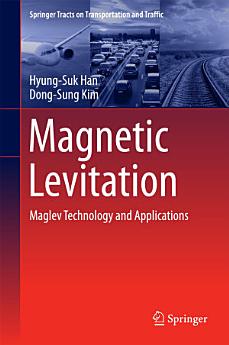Magnetic Levitation: Maglev Technology and Applications
About this ebook
It includes a history of Maglev science and technology showing the various milestones in its advancement. The core concepts, operating principles and main challenges of Maglev applications attempted across various fields are introduced and discussed. The principle difficulties encountered when applying Maglev technology to different systems, namely air gap control and stabilization, are addressed in detail. The book describes how major advancements in linear motor and magnet technologies have enabled the development of the linear-motor-powered Maglev train, which has a high speed advantage over conventional wheeled trains and has the potential to reach speed levels achieved by aircraft. However, many expect that Maglev technology to be a green technology that is applied not only in rail transportation, but also in diverse other fields; to ensure clean transfer in LCD manufacturing, in ropeless high speed elevators, small capacity rail transportation, space vehicle launchers, missile testers, energy storage, and so on. These potential applications and their unique challenges and proposed technological solutions are introduced and discussed in depth.
The book will provide readers from academia, research institutes and industry with insights on where and how to apply Maglev technology, and will serve as a guide to the realization of their Maglev applications.
About the author
Hyung-Suk Han received the Ph.D. degree in mechanical engineering from Ajou University in 1997. He is the head of Department of Magnetic Levitation and Linear Drive at Korea Institute of Machinery & Materials. He has worked extensively in maglev which includes the urban maglev ECOBEE and experimental maglev vehicle SUMA for high speed. His research interests are dynamics simulation, magnetic levitation control and certification of maglev vehicle performances. He has been attempting to apply maglev technology to new applications such as clean conveyor and amusement rides.
Dong-Sung Kim received B.S. in Mechanics and Design from Seoul National University and M.S. in Mechanical Engineering from Changwon National University, and Dr-Ing. in Mechanical Engineering from Ecole Centrale de Nantes in 1996. For 8 years since 1997, he carried out National Research Projects of a developing low-medium speed urban maglev vehicle, as the Head ofVehicle Engineering Group in New Transport Technology Department at Korea Institute of Machinery and Materials. In 2006, he was a core project manager of Systems Engineering in the Urban Maglev (ECOBEE) Program funded by Korean Government. He currently continues to try to promote a commercialization and application of the urban maglev system.







